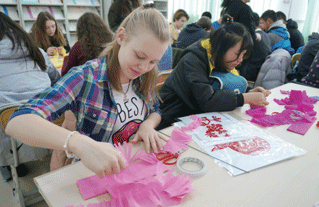Nations learning from each other
By Wang Mingjie ( China Daily UK ) Updated: 2016-12-28 17:17:06
 |
|
Chinese math teacher Jin Xiangjun helps British students at a primary school. [Photo/Xinhua] |
In 2016, the UK government decided that the Chinese approach to math adds up.
In July, the education ministry announced it was spending 41 million pounds ($50 million) in 8,000 primary schools throughout the country to support the "mastery" approach to math teaching, in the hope of bringing English pupils up to the standard of their Asian peers.
It was a sign of strengthening relations between China and the UK, which are likely to see a new phase of education collaboration develop in 2017.
During the latest China-UK High-Level People-to-People Dialogue in Shanghai, the two countries signed agreements on elementary education, language teaching, sport training, higher education and exchanges.
Improving English pupils' math skills will remain a priority, highlighted by an extension of the Shanghai math teachers exchange program that will see more teachers visit each other's countries during the next two academic years.
The mastery approach will continue to be the teaching model to which math teachers in England aspire. A recent independent research study from the University of Oxford said students taught through traditional Asian mastery methods do significantly better.
Meanwhile, the trend toward more Chinese students enrolling at British boarding schools is expected to grow, as parents seek to prepare their children for entry into top-tier British universities and give them an early foothold in the country.
Figures from the Independent School Council, a nonprofit organization representing more than 1,200 schools, show that some 6,300 Chinese students with parents not living in the UK were studying at British private schools in 2016, an almost 70 percent increase during five years.
William Vanbergen, the founder of Shanghai-based BE Education, an organization that helps Chinese students gain entry to elite UK schools, expects that number to grow.
With an increasingly large pool of private wealth in China, more and more Chinese families are able to afford a broader education and overall development opportunities for their children from an earlier age. As a result, the number of young Chinese children educated at UK independent schools is likely to continue to grow.
"It's something we have noticed for a while," said Vanbergen. "The wealthier the parents are, the more they value holistic education that develops their children's abilities, rather than just prepare them to pass an exam."
Meanwhile, among UK pupils, a mastery of Mandarin is being seen as increasingly important as the country seeks to remain globally competitive. The number of entrants sitting Mandarin exams as part of the General Certificate of Secondary Education increased 75 percent during the past five years, to 3,438 students. In September, the government launched its 10 million pound ($12.96 million) Mandarin Excellence Programme to ensure teenagers become fluent in the language by 2020.
Football training and development will form another pillar of China-UK collaboration.
China's national football strategy has placed a major emphasis on grassroots development and the training of coaches, while the English leagues have been working hard for many years to build a fl ow of talented players at club and national level.
English coaches have been heading to China to work with players and there has been a steady fl ow of Chinese coaches and officials heading to England to learn more about delivering grassroots training programs.
|
|
|
|
|
|
|
|
Features
 Merkel's lighthearted moments in China
Merkel's lighthearted moments in China  British pub becomes tourist attraction after Xi's visit
British pub becomes tourist attraction after Xi's visit
European Weekly
 We will not give up search, Li vows
We will not give up search, Li vows
International hunt for missing airliner continues after fruitless six-day search




















